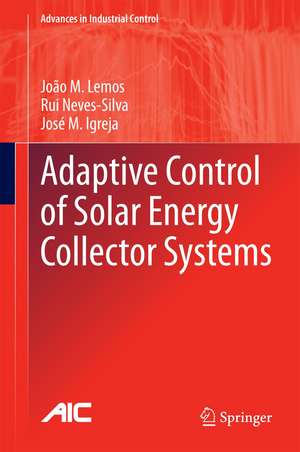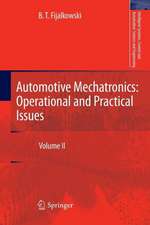Adaptive Control of Solar Energy Collector Systems: Advances in Industrial Control
Autor João M. Lemos, Rui Neves-Silva, José M. Igrejaen Limba Engleză Hardback – 25 iun 2014
- they are distributed-parameter systems, i.e., systems with dynamics that depend on space as well as time;
- their dynamics is nonlinear, with a bilinear structure;
- there is a significant level of uncertainty in plant knowledge.
Adaptive Control of Solar Energy Collector Systems demonstrates the dynamics of solar fields to be rich enough to present a challenge to the control designer while, at the same time, simple enough to allow analytic work to be done, providing case studies on dynamics and nonlinear control design in a simple and revealing, but nontrivial way.
The control approaches treated in this monograph can be generalized to apply to other plants modelled by hyperbolic partial differential equations, especially process plants in which transport phenomena occur, plants like dryers, steam super-heaters and even highway traffic.
An important example, used repeatedly throughout the text, is a distributed-collector solar field installed at Plataforma Solar de Almeria, located in southern Spain. The control algorithms laid out in the text are illustrated with experimental results generated from this plant.
Although the primary focus of this monograph is solar energy collector, the range of other systems which can benefit from the methods described will makeit of interest to control engineers working in many industries as well as to academic control researchers interested in adaptive control and its applications.
| Toate formatele și edițiile | Preț | Express |
|---|---|---|
| Paperback (1) | 720.35 lei 6-8 săpt. | |
| Springer International Publishing – 17 sep 2016 | 720.35 lei 6-8 săpt. | |
| Hardback (1) | 645.60 lei 6-8 săpt. | |
| Springer International Publishing – 25 iun 2014 | 645.60 lei 6-8 săpt. |
Din seria Advances in Industrial Control
- 15%
 Preț: 643.34 lei
Preț: 643.34 lei - 23%
 Preț: 582.63 lei
Preț: 582.63 lei - 18%
 Preț: 783.98 lei
Preț: 783.98 lei - 18%
 Preț: 947.35 lei
Preț: 947.35 lei - 20%
 Preț: 568.24 lei
Preț: 568.24 lei - 15%
 Preț: 643.16 lei
Preț: 643.16 lei - 18%
 Preț: 899.21 lei
Preț: 899.21 lei - 18%
 Preț: 891.33 lei
Preț: 891.33 lei - 18%
 Preț: 740.57 lei
Preț: 740.57 lei - 18%
 Preț: 961.23 lei
Preț: 961.23 lei - 18%
 Preț: 955.08 lei
Preț: 955.08 lei - 15%
 Preț: 645.28 lei
Preț: 645.28 lei - 15%
 Preț: 638.43 lei
Preț: 638.43 lei - 18%
 Preț: 901.11 lei
Preț: 901.11 lei - 18%
 Preț: 1410.94 lei
Preț: 1410.94 lei - 18%
 Preț: 728.91 lei
Preț: 728.91 lei - 20%
 Preț: 1003.78 lei
Preț: 1003.78 lei - 18%
 Preț: 947.35 lei
Preț: 947.35 lei - 15%
 Preț: 643.34 lei
Preț: 643.34 lei - 15%
 Preț: 654.30 lei
Preț: 654.30 lei - 18%
 Preț: 950.52 lei
Preț: 950.52 lei - 15%
 Preț: 644.30 lei
Preț: 644.30 lei - 18%
 Preț: 1393.09 lei
Preț: 1393.09 lei - 18%
 Preț: 950.21 lei
Preț: 950.21 lei - 18%
 Preț: 949.90 lei
Preț: 949.90 lei - 18%
 Preț: 949.42 lei
Preț: 949.42 lei - 18%
 Preț: 950.52 lei
Preț: 950.52 lei - 18%
 Preț: 1113.71 lei
Preț: 1113.71 lei - 15%
 Preț: 650.04 lei
Preț: 650.04 lei - 15%
 Preț: 644.95 lei
Preț: 644.95 lei - 18%
 Preț: 950.33 lei
Preț: 950.33 lei - 18%
 Preț: 948.61 lei
Preț: 948.61 lei - 18%
 Preț: 1112.60 lei
Preț: 1112.60 lei - 15%
 Preț: 644.63 lei
Preț: 644.63 lei - 18%
 Preț: 953.20 lei
Preț: 953.20 lei - 18%
 Preț: 945.62 lei
Preț: 945.62 lei - 15%
 Preț: 640.88 lei
Preț: 640.88 lei - 15%
 Preț: 640.88 lei
Preț: 640.88 lei - 20%
 Preț: 650.92 lei
Preț: 650.92 lei - 18%
 Preț: 1112.60 lei
Preț: 1112.60 lei - 20%
 Preț: 998.36 lei
Preț: 998.36 lei - 15%
 Preț: 643.34 lei
Preț: 643.34 lei - 18%
 Preț: 948.92 lei
Preț: 948.92 lei - 18%
 Preț: 1381.43 lei
Preț: 1381.43 lei - 15%
 Preț: 651.51 lei
Preț: 651.51 lei - 15%
 Preț: 647.08 lei
Preț: 647.08 lei - 20%
 Preț: 563.66 lei
Preț: 563.66 lei - 18%
 Preț: 992.64 lei
Preț: 992.64 lei - 18%
 Preț: 1225.79 lei
Preț: 1225.79 lei
Preț: 645.60 lei
Preț vechi: 759.54 lei
-15% Nou
Puncte Express: 968
Preț estimativ în valută:
123.55€ • 128.51$ • 101.100£
123.55€ • 128.51$ • 101.100£
Carte tipărită la comandă
Livrare economică 15-29 aprilie
Preluare comenzi: 021 569.72.76
Specificații
ISBN-13: 9783319068527
ISBN-10: 3319068520
Pagini: 276
Ilustrații: XXII, 253 p. 127 illus.
Dimensiuni: 155 x 235 x 20 mm
Greutate: 0.56 kg
Ediția:2014
Editura: Springer International Publishing
Colecția Springer
Seria Advances in Industrial Control
Locul publicării:Cham, Switzerland
ISBN-10: 3319068520
Pagini: 276
Ilustrații: XXII, 253 p. 127 illus.
Dimensiuni: 155 x 235 x 20 mm
Greutate: 0.56 kg
Ediția:2014
Editura: Springer International Publishing
Colecția Springer
Seria Advances in Industrial Control
Locul publicării:Cham, Switzerland
Public țintă
Professional/practitionerCuprins
Solar Energy Collector Systems.- Models and Dynamics.- Predictive Adaptive Control with Linear Models.- Multiple-Model Adaptive Control.- Nonlinear Adaptive Predictive Control.- Nonlinear Adaptive Control.- Adaptive Motion Planning.- Conclusions.- Appendices.
Textul de pe ultima copertă
This book describes methods for adaptive control of distributed-collector solar fields: plants that collect solar energy and deliver it in thermal form. Controller design methods are presented that can overcome difficulties found in these type of plants:
Adaptive Control of Solar Energy Collector Systems demonstrates the dynamics of solar fields to be rich enough to present a challenge to the control designer while, at the same time, simple enough to allow analytic work to be done, providing case studies on dynamics and nonlinear control design in a simple and revealing, but nontrivial way.
The control approaches treated in this monograph can be generalized to apply to other plants modelled by hyperbolic partial differential equations, especially process plants in which transport phenomena occur, plants like dryers, steam super-heaters and even highway traffic.
An important example, used repeatedly throughout the text, is a distributed-collector solar field installed at Plataforma Solar de Almeria, located in southern Spain. The control algorithms laid out in the text are illustrated with experimental results generated from this plant.
Although the primary focus of this monograph is solar energy collector, the range of other systems which can benefit from the methods described will makeit of interest to control engineers working in many industries as well as to academic control researchers interested in adaptive control and its applications.
Advances in Industrial Control aims to report and encourage the transfer of technology in control engineering. The rapid development of control technology has an impact on all areas of the control discipline. The series offers an opportunity for researchers to present an extended exposition of new work in all aspects of industrial control.
- they are distributed-parameter systems, i.e., systems with dynamics that depend on space as well as time;
- their dynamics is nonlinear, with a bilinear structure;
- there is a significant level of uncertainty in plant knowledge.
Adaptive Control of Solar Energy Collector Systems demonstrates the dynamics of solar fields to be rich enough to present a challenge to the control designer while, at the same time, simple enough to allow analytic work to be done, providing case studies on dynamics and nonlinear control design in a simple and revealing, but nontrivial way.
The control approaches treated in this monograph can be generalized to apply to other plants modelled by hyperbolic partial differential equations, especially process plants in which transport phenomena occur, plants like dryers, steam super-heaters and even highway traffic.
An important example, used repeatedly throughout the text, is a distributed-collector solar field installed at Plataforma Solar de Almeria, located in southern Spain. The control algorithms laid out in the text are illustrated with experimental results generated from this plant.
Although the primary focus of this monograph is solar energy collector, the range of other systems which can benefit from the methods described will makeit of interest to control engineers working in many industries as well as to academic control researchers interested in adaptive control and its applications.
Advances in Industrial Control aims to report and encourage the transfer of technology in control engineering. The rapid development of control technology has an impact on all areas of the control discipline. The series offers an opportunity for researchers to present an extended exposition of new work in all aspects of industrial control.
Caracteristici
Illustrates methods described with experimental case studies on a real plant Describes advanced control methods accessible to the practically-minded professional Explains how plant-wide control depends on both time and space Shows the reader how the methods described can be generalized to whole classes of superficially unrelated systems Includes supplementary material: sn.pub/extras














